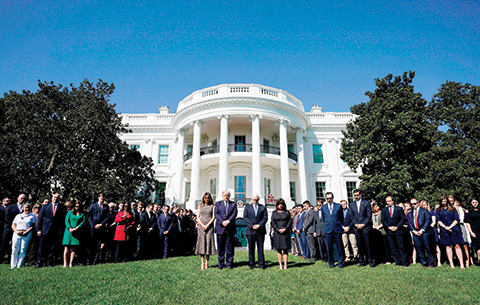
WASHINGTON: US President Donald Trump and First Lady Melania Trump along with Vice President Mike Pence and his wife Karen Pence take part in a moment of silence for the victims of the Las Vegas shootings, on the South Lawn of the White House. - AFP
HONG KONG: Across the globe, risks of terrorism and other violence have made tight security at hotels and resorts routine, even in countries where strict gun control laws may help prevent the kind of shooting attack that occurred Sunday night in Las Vegas. Security varies widely from place to place: in many cities luxury hotels have entrances that open straight into shopping malls. Hotel lobbies often serve as a refuge from noisy, chaotic city streets, and are generally easily accessible.
But increasingly, hotel operators are deploying armed guards, vehicle barricades, x-ray machines and other security devices to reduce risks. The most recent major incident in Asia, at the Resorts World Manila casino in the Philippines, shared similarities with the Las Vegas attack. The attacker in that case was a man with a gambling addiction who got past hotel security with an ammunition vest and assault rifle, carrying out an arson attack that left 37 dead, mostly from smoke inhalation. The attacker later killed himself.
Afterward, Resorts World said it had hired a security contractor, Blackpanda, and established new emergency, safety and security protocols. A nearby casino resort, City of Dreams, also said it had tightened security. Even before the attack, visitors to Resorts World, like many other hotels, office complexes and shopping malls in Manila, were required to pass through metal detectors and have their bags checked in x-ray scanners to enter.
Such precautions are not the rule across Asia, but luxury hotels in the region generally are on the alert for terrorist attacks and other violence. In 2009, attackers in Indonesia smuggled explosives past security guards and metal detectors, setting off a blast at the Marriott and the Ritz-Carlton hotels in Jakarta that killed eight. Six years earlier, terrorists set off a car bomb at the Jakarta Marriott, killing 12. In India in 2008, terrorists targeted two luxury hotels, a train station and restaurant in a 60-hour siege in Mumbai that left more than 160 dead.
Hotel chains operating in India including Accor, Hyatt and Marriott now use handheld trace detectors and x-ray scanners to check for explosives and contraband. The upscale Lemon Tree Hotel at New Delhi's airport brought in a facial recognition system to keep track of visitors. "Both Indonesia and India have strengthened hotel security since these events and others in the region too," said Mario Hardy, CEO of the Pacific Asia Travel Association. "Vehicles are checked and many hotels have added X-ray scanners at the entrances of the hotels and CCTV monitoring." He added that, "as consumers we may sometime see those as nuisance; but I think events such as these remind us all the importance of security measures."
'Bump-stocks'
The gunman who unleashed hundreds of rounds of gunfire on a crowd of concertgoers in Las Vegas had two "bump-stocks" that could have converted semi-automatic firearms into fully automatic ones, officials said. The devices have attracted scrutiny in recent years from authorities. California Sen Dianne Feinstein has long railed against them. Several years ago, she told The Associated Press she was concerned about the emergence of new technologies that could retrofit firearms to make them fully automatic.
"This replacement shoulder stock turns a semi-automatic rifle into a weapon that can fire at a rate of 400 to 800 rounds per minute," she said. A semi-automatic weapon requires one trigger pull for each round fired. With a fully automatic firearm, one trigger pull can unleash continuous rounds until the magazine is empty. The purchasing of fully automatic weapons has been significantly restricted in the US since the 1930s. In 1986, the federal National Firearms Act was amended further to prohibit the transfer or possession of machine guns by civilians, with an exception for those previously manufactured and registered.
Numerous attempts to design retrofits failed until recent years when bump stocks came on the market. The device basically replaces the gun's shoulder rest, with a "support step" that covers the trigger opening. By holding the pistol grip with one hand and pushing forward on the barrel with the other, the shooter's finger comes in contact with the trigger. The recoil causes the gun to buck back and forth, "bumping" the trigger. Technically, that means the finger is pulling the trigger for each round fired, keeping the weapon a legal semi-automatic.
Las Vegas shooter Stephen Paddock had 23 guns in his hotel room. Two officials familiar with the investigation told the AP that Paddock had two bump stocks. They are investigating whether those stocks were used to modify weapons used in the massacre, according to the officials, who were briefed by law enforcement and spoke on condition of anonymity because the investigation is still unfolding. Paddock killed 59 people and wounded hundreds more at a country music festival near his hotel. Police stormed his 32nd floor hotel room and found that he had killed himself after committing the deadliest mass shooting in modern US history.- Agencies











